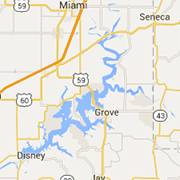July 3 GRDA Weekly Updates
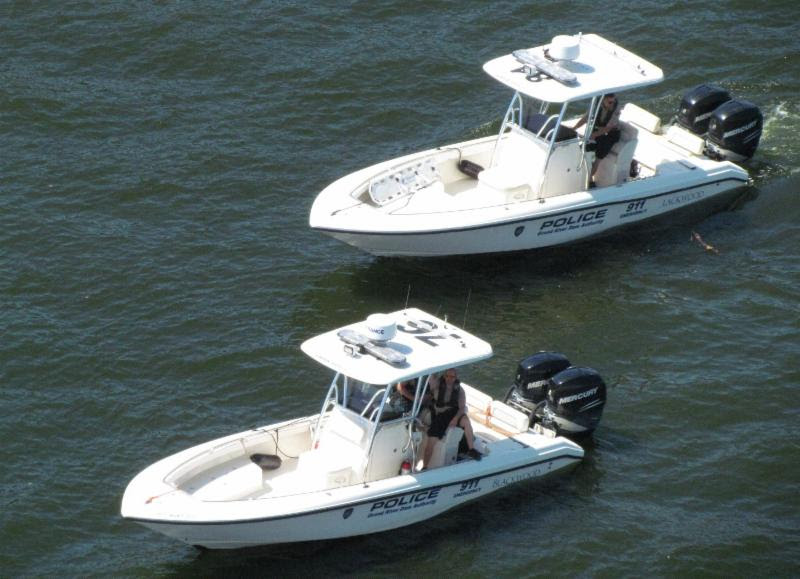
Personal Watercraft Safety & You

At an average length of around 10 feet, personal watercraft (PWC) may seem small, but they come with some pretty big responsibility. With the horsepower of a large outboard engine and the acceleration of a motorcycle, PWC are not toys. One of the most common complaints that GRDA Police respond to is violations committed by people operating PWC’s, and all too often we find the operator has little or no knowledge on how to operate the vessel. The U.S. Coast Guard considers personal watercraft Class A vessels, which means all safety equipment and operation laws that apply to boats under 16 feet also apply to a PWC. Most states, including Oklahoma, have operator age and education requirements, too. So before you launch, here are a few things you’ll need to know to have a safe and hassle-free day on the water.
Required Equipment for A PWC:
- A life jacket for each person and any person being towed. Make sure the life jacket is designed for PWC use and is Strength Tested for the speed of the PWC that is operated.
- A Coast Guard approved B-1 fire extinguisher.
- An approved sound signaling device such as a whistle or horn.
- An emergency engine cutoff lanyard attached to the operator.
- Proper display of registration numbers, letters and validation decals.
- Vessel registration, to be displayed when requested.
- A dewatering device such as a hand operated bilge pump or bailing device.
- An anchor and enough anchor line for your area.
- A functioning backfire flame arrestor and passive ventilation system.
Recommended Safety Equipment:
- Hand-held VHF radio or a cell phone.
- A basic first-aid kit, sunscreen, and burn cream.
- If pulling a skier or other tow-sport participant, a skier-down flag is helpful and rear–view mirrors are required.
- It’s recommended you have a suitable, daytime distress signal such as flares, an orange flag, or signal mirror.
Follow These Rules for a Safe & Fun Ride
PWC manufacturers recommend a minimum operator age of 16. However, operator laws vary from state to state, and the state of Oklahoma allows the operation of a PWC by children the age of 12 to 16 IF they have proof of completing an approved boating safety course and are under the supervision of an adult. If you loan your craft, be certain whoever operates it is fully aware of the local and federal boating laws and know how to operate your craft. You’re responsible when you loan your PWC to others to operate. PWC owners will allow friends and family to operate the vessels with minimal knowledge or instruction on how to do so safely and legally, which frequently results in violations and all too often a tragedy. A PWC owner that allows an unqualified individual to operate a vessel not only risks the possibility of criminal charges, but also civil liability if someone is injured by an inexperienced operator. In order to reduce your risks, invoke the following rules regarding PWC operation:
- Everyone must properly wear a life jacket approved for PWC use at all times.
- If the PWC is equipped with a lanyard-type ignition safety switch, the lanyard must be attached to the operator at all times while the PWC is in operation.
- The most important thing to remember about steering most PWC’s is that you must have power in order to maintain control. If you allow the engine on a PWC to return to idle or shut off during operation, you may lose all steering control.
- Know the laws and don’t push the limits. Ignorance of the law is no excuse, and violations can result in hefty fines from citations.
- Learn the meaning of navigation buoys, markers and signs and know what regulations exist under local laws.
- Jumping the wake of a passing boat or riding too close to another PWC or boat creates risk and is restricted or even prohibited. You must remain at least 50 feet away from another moving vessel, cannot weave through congested traffic and must be at idle speed within 150 feet of any boat that is anchored or moored, a dock, ramp or bridge, just like any other vessel is required.
- Never ride after consuming drugs or alcohol.
- Carry no more passengers than the vessel’s rating allows. The Capacity Plate on the PWC will provide that information. Remember that a person being towed is considered a passenger.
- Check your craft for proper function before riding.
- Respect ecologically sensitive areas and wildlife, and it is illegal to chase, harass or disturb wildlife on a PWC.
- Large vessels, sailboats under sail, and paddle craft should always be given the right-of-way.
- When meeting another craft head-on, steer to the right and pass like cars.
- If overtaking another boat, you may pass on either side, but you must keep clear.
- If you’re about to cross paths with another vessel, the craft on the right should be allowed to continue at the same speed and direction, and you must alter your speed and direction to pass safely behind.
- You must take action to avoid collisions and maintain a proper lookout by scanning constantly.
- If you are unsure about the rules of the road, reduce your speed and take early defensive action.
- PWC’s may not be operated on GRDA lakes at night.
PWC’s are fun and inexpensive to operate. But like any other vehicle, they can be dangerous to operate for those that don’t have the knowledge of how to do so safely. To learn more on the Rules of the Road, we highly recommend you take a boating safety course.
On The Road or The Water, Your Headed Nowhere Fast While Impaired

GRDA Police Stressing Safety for July 4 Boating
On the waters of Grand and Hudson lakes, as well as the Illinois River, the July 4thholiday is often the high point of the summer season. In anticipation of all the water enthusiasts paying a visit to enjoy Oklahoma’s premier recreation destinations, the Grand River Dam Authority Police Department wants to remind everyone to boat and float safe, smart and sober.
One very special message the GRDA Police shares with Grand Lake visitors each July 4th holiday is the reminder that special boating rules are in effect for the Duck Creek arm of the lake. On the actual day of the Duck Creek Fireworks (Wednesday, July 4) all watercraft shall operate at “Idle” and avoid producing a wake at all times in Duck Creek (all day, all night).
Whether your plans are to watch the Duck Creek fireworks or any other lake-area fireworks display from the water, the following tips can help promote a safe and enjoyable holiday outing.
- Before you leave the dock, know the stability, load capability and handling of the vessel you are operating. Remember, every boat is different. Check the water conditions and know where hazards like sandbars and stump beds are located.
- Before you leave the dock, check the weather conditions. Don’t get caught on the lake in a storm you could have avoided.
- Airplane pilots file a flight plan. Boaters need a float plan. Tell someone responsible where you are going and when you expect to return.
- Don’t drink and boat! Most lake accidents are alcohol related. Don’t become a statistic.
- Floating the scenic Illinois River? GRDA reminds you to let the commercial float operator know if you or anyone in your party are a first-time or novice floater(s). They may be able to pair you with an experienced paddler/floater or float you in a raft where there is a lesser chance for capsizing.
- DON’T dive into the river from bridges, bluffs, stream banks and trees.
- If you are tired while floating, take a break on the bank or on a gravel bar to rest.
- Never swim or boat alone. Stay within sight of companions.
GRDA also reminds you that the July 4th holiday is a great chance to take a free tour of historic Pensacola Dam. Tours originate from the GRDA Ecosystems and Education Center, located just west of the dam, in Langley. If you are planning on taking the tour, remember to wear comfortable shoes (there is a fair amount of walking involved) and dress for the weather. Also, all persons over 18 are required to present some form of ID. Tours are available seven days a week (9 AM to 4 PM).
Whether you are coming to the lake, to the river, to the dam or maybe to all three, GRDA encourages you to keep these tips in mind as you enjoy the Independence Day holiday.
For more information about the GRDA Police Department or how an officer can assist you, contact the department at (918) 256-0911 or visit grda.com. Finally, if you need assistance from your boat, the GRDA Police Department encourages you to call 911. If you do not have a cell phone available, you can radio the GRDA Police on Marine Band 16.
Info


GRDA Controlled Hunts 2018

The Grand River Dam Authority will once again hold controlled hunts, for the upcoming deer and waterfowl seasons, on its Ottawa County properties along the Neosho River. Those interested in applying for these special draw hunts, can register online at www.grda.com/grda-hunting-drawing. The registration period begins June 1 and runs throughJuly 31.
Prospective hunters can apply as individuals or with a group of up to four individuals. This year’s schedule will include a “youth-only” hunt during the youth deer gun season. While the hunts are open to the public, GRDA also asks that residents of its municipal customer, public power communities upload a copy of a utility bill as proof of residence for consideration for special opening day hunts. The controlled hunts for deer and waterfowl will begin this fall.
Illinois River
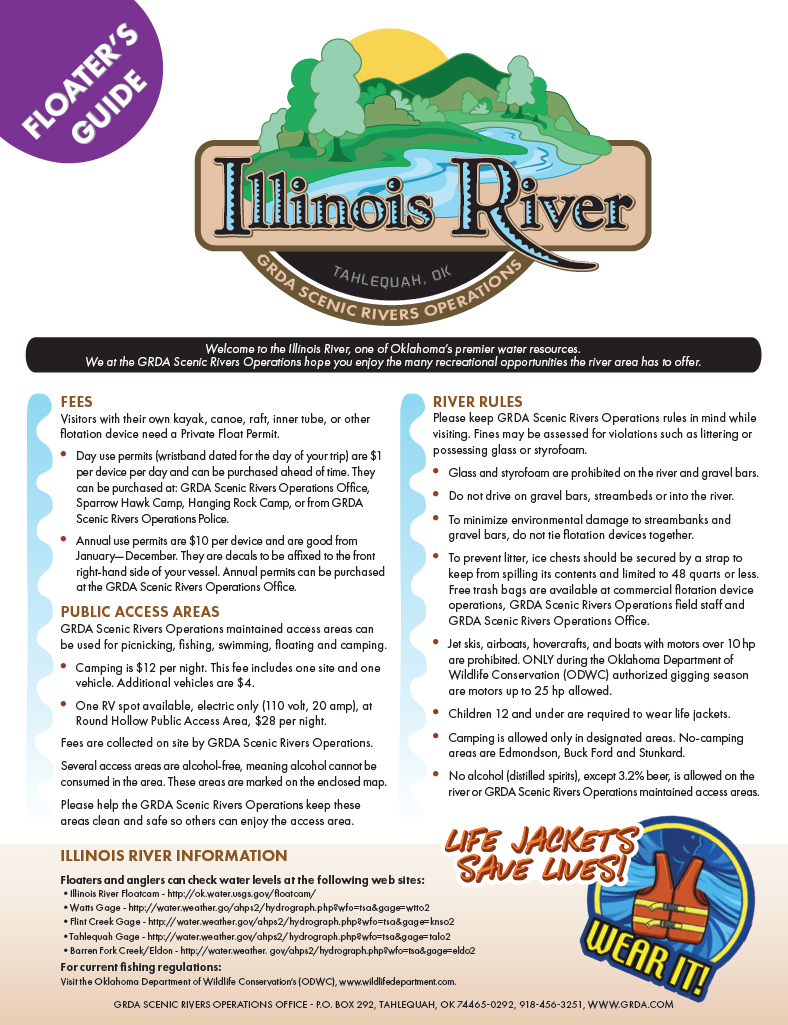
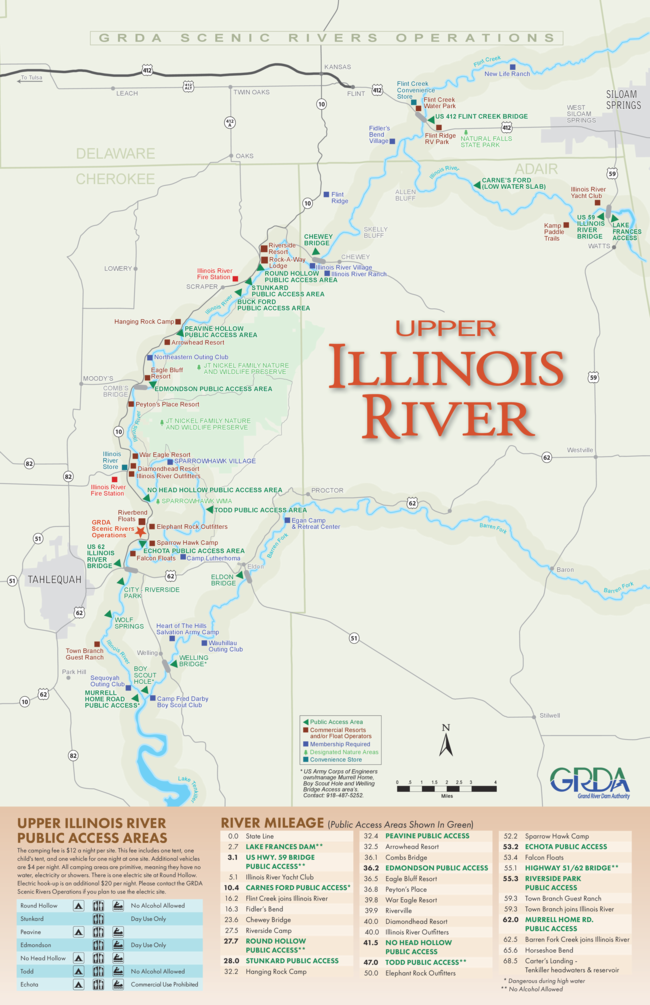
It's Race Time on Grand Lake!

SDBA Speeds into Wolf Creek
The Grand River Dam Authority Police Department will again be closing portions of the Wolf Creek arm of Grand Lake, as well as the Wolf Creek boat ramp July 7 and 8 for the Southern Drag Boat Association Wolf Creek Nationals in Grove. Home owners adjacent to the event will be allowed access to their private docks with proof of residency.
All vessel operators should watch for special event navigational buoys and officers that will be present in the area. Spectators will be able to watch the race from the water, but will be restricted from entering the race area at the special event buoy line in the Wolf Creek channel.
According to SDBA, the national race will feature a quarter mile track where spectators will be able to watch boats reaching speeds up to 230 miles per hour. The event is slated to include 120 racing teams with fuel hydro and alcohol fuel boats and is expected to draw around 3,000 spectators. The race qualifications will be held on July 7 from 8 am to 6 pm, with racing heats held July 8 from 10 to 5 pm. For more information, visit www.sdbaracing.com.
Did You Know?

True or False: The "Move Over Law" applies to emergency vessels on the lake.
Answer: True - GRDA Regulations require that "Vessels shall stop when directed, or operate at idle speed within five hundred (500) feet from emergency vessels while their emergency lights are activated."
Special Event Speed Restrictions

Special Event Speed Restrictions will be in Effect in Duck Creek on July 4.
All Vessels are Required to Adhere to the No Wake Restriction for the Entire Day Tomorrow for the Duck Creek Fireworks!
Lake Rules
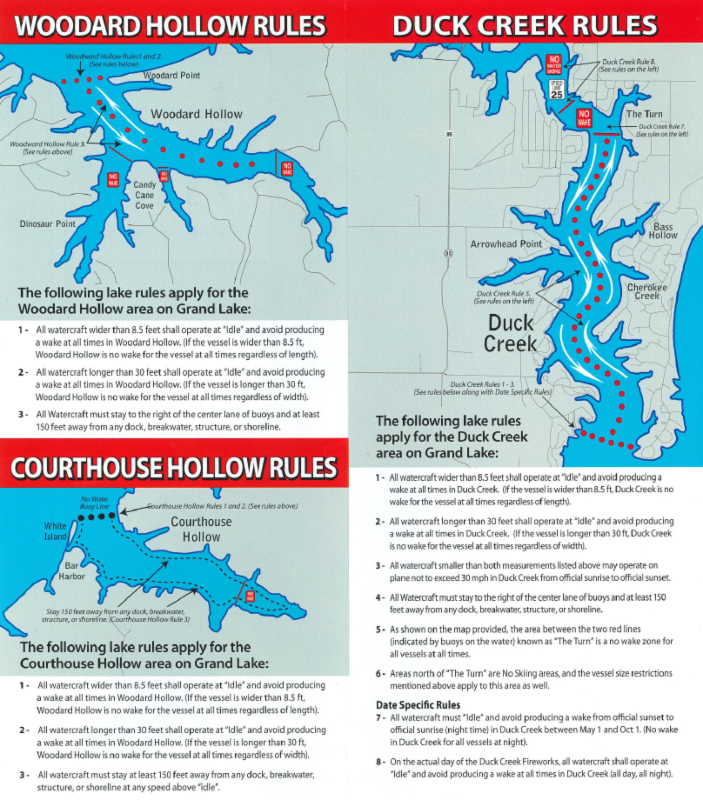
Updates on the Web

Did you not receive our latest GRDA Update? Do you have a friend that wants to see our Updates? You can now go to our website at GRDA.com to view the latest edition of GRDA Police Updates. Go to the Lakes/River tab, open the GRDA Police tab and click on the GRDA Police Update for the latest version of our email release.
Boating Tips From the GLSPS

When boating in a busy cove with many boats rafted together, it is important to pick your path and be aware how your boat will respond when changing directions. Learn to recognize the pivot point of your boat. This is a point that your boat will rotate around when turning. At slow speeds the point is closer to the bow which will cause your stern to swing wide possibly hitting another boat. To prevent this happening commence your turn long before you reach the boat that you are attempting to avoid.
Interested in becoming more confident in your boating skills? Boat Smart from the start and take a course from America’s Boating Club, the United States Power Squadrons. For local information visit our website at: usps.org/grandlake or on Face Book at GLSPS.
NAV TIME

A Summary of Boating Laws, Navigation Regulations & Tips
That All Boat Operators Should Know
Encountering Other Vessels
Even though no vessel has the “right-of-way” over another vessel, there are some rules that every operator should follow when encountering other vessels. It is the responsibility of both operators to take the action needed to avoid a collision.
To prevent collisions, every operator should follow the three basic rules of navigation.
- Practice good seamanship.
- Keep a sharp lookout.
- Maintain a safe speed and distance.
Navigation Rules
There are two terms that help explain these navigation rules.
Stand-on vessel: The vessel that should maintain its course and speed
Give-way vessel: The vessel that must take early and substantial action to avoid collision by stopping, slowing down, or changing course
Meeting Head-On








